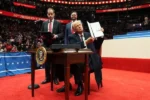Imagine you had a really important job that helped keep everyone safe and make sure rules were followed. Now, what if one day, the boss decided to fire you without a good reason? That’s exactly what happened to a group of federal watchdogs who were suddenly removed from their jobs by President Trump. These watchdogs, who were appointed to help oversee how money is spent and ensure fairness in government, are now banding together to fight back. They believe their firings were unfair and against the law, and they’re taking their case to court to get their jobs back. Let’s dive into this story and see what happens next!
| Category | Details |
|---|---|
| Watchdogs’ Lawsuit | A group of watchdogs, removed by Trump, is suing his administration, claiming firings violated federal law. |
| Plaintiffs | Includes IGs from various departments, such as DOD, VA, HHS, State, Education, Agriculture, Labor, and SBA. |
| Legal Representation | Represented by David Ogden and Seth Waxman. |
| Complaint Claims | Claims removals were illegal and asserts they remain IGs unless legally removed. |
| Federal Law Reference | Federal law requires 30 days notice to Congress for IG removals. |
| Integrity Requirements | IGs must serve without political bias, based on integrity and ability. |
| Significant Contributions | IGs made substantial impacts, like generating over $14 billion for the SBA. |
| Termination Communication | Fired via brief emails citing ‘changing priorities’. |
| Injunctive Relief | Plaintiffs seek relief to prevent obstruction of their duties. |
| Trump’s Claims | Trump claimed removals were common, but did not assert legal compliance. |
| Additional Lawsuits | Other terminations have led to lawsuits, including a whistleblower advocate’s case. |
| Official Statements | White House claims dismissed officials were ‘far-left’ appointees. |
The Role of Inspectors General in Government
Inspectors General (IGs) play a vital role in keeping government agencies accountable. They are responsible for overseeing how federal funds are spent and ensuring that agencies operate honestly and efficiently. Appointed by the president, these officials work independently and focus on investigating fraud, waste, and abuse within their departments. Their job is essential for maintaining public trust in government operations, making sure that taxpayer money is used properly.
IGs are expected to act without political bias, meaning they should not let party politics influence their work. This independence allows them to provide unbiased reports and recommendations that can lead to improvements in government operations. Their work often involves conducting audits and investigations that reveal important information about government spending and operations. When IGs are removed without proper legal procedures, it raises concerns about transparency and accountability in government.
Legal Challenges to Dismissals
Recently, several former Inspectors General have filed lawsuits against the Trump administration, claiming their dismissals were illegal. They argue that the President did not follow the proper legal process required by federal law, which mandates that IGs can only be removed after notifying Congress and providing valid reasons. This legal action highlights the importance of following rules to ensure that government officials can do their jobs effectively.
The lawsuits emphasize that these officials were dedicated public servants who worked under both Democratic and Republican presidents. By challenging their removals, they aim to restore their positions and protect the integrity of the Inspectors General role. These legal battles could set important precedents for how future administrations handle the dismissal of independent oversight officials, ensuring that such decisions are made lawfully and fairly.
The Impact of Political Dismissals
Political dismissals can have a significant impact on how government agencies function. When Inspectors General are removed without following legal procedures, it can create a chilling effect on other officials. They may fear retaliation for doing their jobs, leading to less transparency and accountability in government. This lack of oversight can allow misconduct to go unchecked, ultimately harming the integrity of federal operations.
The recent wave of dismissals has sparked discussions about the need for stronger protections for Inspectors General. Supporters argue that these officials should be able to work without fear of being fired for political reasons. By ensuring that IGs can perform their duties freely, the government can promote a culture of accountability, where public servants focus on serving the American people rather than navigating political pressures.
The Legal Basis for the Watchdogs’ Lawsuit
The watchdogs’ lawsuit hinges on the claim that their dismissals violated federal statutes designed to protect the independence of Inspectors General (IGs). According to these laws, the President is required to notify Congress at least 30 days prior to terminating any IG, providing valid reasons for such actions. This legal framework ensures that IGs can operate without political interference, safeguarding their role as impartial overseers of federal spending and operations.
By asserting that their firings were ‘legal nullities,’ the plaintiffs aim to reinforce the importance of these protections in maintaining accountability within the federal government. Their attorneys argue that the swift and vague nature of their dismissals—delivered via brief emails—demonstrates a blatant disregard for established laws intended to uphold integrity and transparency in federal oversight.
The Role and Impact of Inspectors General
Inspectors General play a crucial role in the federal government, acting as independent watchdogs to ensure accountability and integrity in the use of public funds. These officials are tasked with conducting audits, investigations, and evaluations to identify inefficiencies and misconduct within their respective agencies. The significant monetary impact reported by IGs, such as the over $14 billion attributed to the Small Business Administration’s IG, underscores their importance in safeguarding taxpayer dollars and promoting effective government operations.
Moreover, the bipartisan nature of many IGs’ work highlights their commitment to non-partisan oversight, as they have served under various administrations regardless of political affiliation. This independence allows them to provide objective assessments that can lead to meaningful reforms and improvements, ultimately benefitting the public and enhancing trust in government.
Repercussions of Dismissals on Federal Oversight
The mass dismissals of Inspectors General by the Trump administration raise serious concerns about the future of federal oversight. If these positions are filled with individuals who lack the independence or integrity required for the role, it could lead to a significant decline in accountability within federal agencies. The plaintiffs in this lawsuit argue that the abrupt terminations have already created a chilling effect on oversight functions, as remaining IGs may feel pressured to conform to the administration’s agenda rather than report on misconduct.
Furthermore, the removal of experienced watchdogs disrupts continuity in federal oversight, potentially allowing waste, fraud, and abuse to go unchecked. This can undermine public confidence in government operations and hinder the effective management of taxpayer resources, making it crucial to ensure that IGs can fulfill their roles without political interference.
Implications for Future Federal Appointments
The legal battle initiated by the watchdogs not only seeks to reinstate the fired IGs but also sets a critical precedent for future federal appointments. If the courts uphold the principles outlined in their complaint, it could reinforce the notion that political motivations should not dictate personnel decisions in oversight roles. This could lead to more rigorous adherence to federal statutes regarding the removal of IGs, ensuring that such actions are justified and transparent.
Moreover, this case may inspire other federal employees facing similar unjust dismissals to challenge their terminations, potentially igniting a broader movement advocating for workplace protections against political retribution. As these legal precedents unfold, they may encourage a culture of accountability and integrity within the federal workforce, crucial for restoring public trust in government institutions.
Frequently Asked Questions
Why did some watchdogs sue President Trump?
The watchdogs sued President Trump because they believed their firings were illegal. They claimed they were fired without proper notice, which goes against federal rules.
What is an Inspector General (IG)?
An **Inspector General (IG)** is a government official who ensures that money is spent correctly and that laws are followed. They help keep the government honest!
What rules must the President follow to fire an IG?
The President must inform Congress **30 days** before firing an IG and give reasons for the dismissal. This is to ensure fairness and transparency.
What happens to the watchdogs after they were fired?
After being fired, the watchdogs found it hard to do their jobs. They lost access to emails, phones, and buildings they needed to work in.
How did the watchdogs feel about their contributions before being fired?
The watchdogs felt proud of their work. They had saved a lot of money for the government and made many recommendations to improve services.
What did the fired IGs want from their lawsuit?
The fired IGs wanted the lawsuit to prove their firings were illegal. They wanted to keep their jobs and continue their important work.
What is the main goal of the watchdogs in their lawsuit?
The main goal of the watchdogs is to stop the Trump administration from preventing them from doing their jobs. They want to ensure that the rules are followed.
Summary
A group of former federal watchdogs has sued President Trump, claiming their recent firings violated federal law. They argue that these dismissals undermine impartial oversight of government actions. The plaintiffs, who served as inspectors general across various departments, assert their removals were illegal as they were not given proper notice or justification. They seek to regain their positions and prevent further obstruction of their duties. This lawsuit follows a pattern of dismissals under Trump’s administration, raising concerns about adherence to legal protocols regarding the removal of federal officials.







